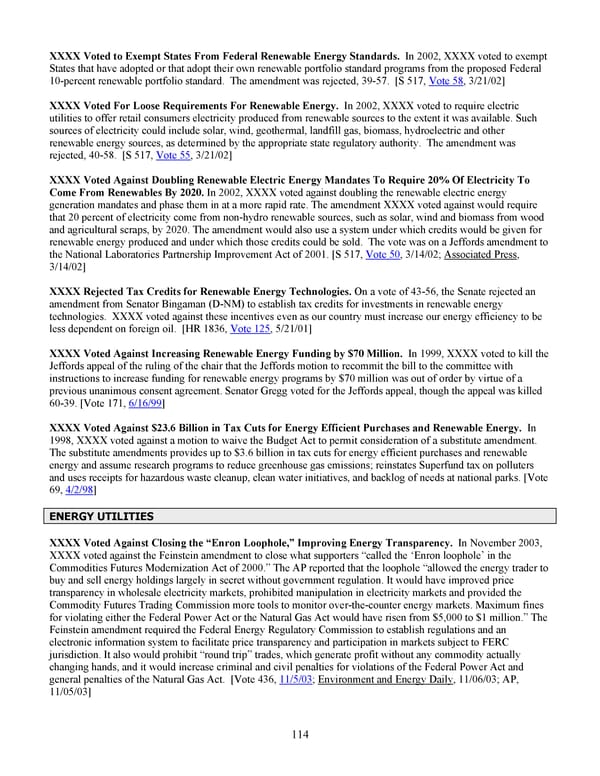XXXX Voted to Exempt States From Federal Renewable Energy Standards. In 2002, XXXX voted to exempt States that have adopted or that adopt their own renewable portfolio standard programs from the proposed Federal 10-percent renewable portfolio standard. The amendment was rejected, 39-57. [S 517, Vote 58, 3/21/02] XXXX Voted For Loose Requirements For Renewable Energy. In 2002, XXXX voted to require electric utilities to offer retail consumers electricity produced from renewable sources to the extent it was available. Such sources of electricity could include solar, wind, geothermal, landfill gas, biomass, hydroelectric and other renewable energy sources, as determined by the appropriate state regulatory authority. The amendment was rejected, 40-58. [S 517, Vote 55, 3/21/02] XXXX Voted Against Doubling Renewable Electric Energy Mandates To Require 20% Of Electricity To Come From Renewables By 2020. In 2002, XXXX voted against doubling the renewable electric energy generation mandates and phase them in at a more rapid rate. The amendment XXXX voted against would require that 20 percent of electricity come from non-hydro renewable sources, such as solar, wind and biomass from wood and agricultural scraps, by 2020. The amendment would also use a system under which credits would be given for renewable energy produced and under which those credits could be sold. The vote was on a Jeffords amendment to the National Laboratories Partnership Improvement Act of 2001. [S 517, Vote 50, 3/14/02; Associated Press, 3/14/02] XXXX Rejected Tax Credits for Renewable Energy Technologies. On a vote of 43-56, the Senate rejected an amendment from Senator Bingaman (D-NM) to establish tax credits for investments in renewable energy technologies. XXXX voted against these incentives even as our country must increase our energy efficiency to be less dependent on foreign oil. [HR 1836, Vote 125, 5/21/01] XXXX Voted Against Increasing Renewable Energy Funding by $70 Million. In 1999, XXXX voted to kill the Jeffords appeal of the ruling of the chair that the Jeffords motion to recommit the bill to the committee with instructions to increase funding for renewable energy programs by $70 million was out of order by virtue of a previous unanimous consent agreement. Senator Gregg voted for the Jeffords appeal, though the appeal was killed 60-39. [Vote 171, 6/16/99] XXXX Voted Against $23.6 Billion in Tax Cuts for Energy Efficient Purchases and Renewable Energy. In 1998, XXXX voted against a motion to waive the Budget Act to permit consideration of a substitute amendment. The substitute amendments provides up to $3.6 billion in tax cuts for energy efficient purchases and renewable energy and assume research programs to reduce greenhouse gas emissions; reinstates Superfund tax on polluters and uses receipts for hazardous waste cleanup, clean water initiatives, and backlog of needs at national parks. [Vote 69, 4/2/98] ENERGY UTILITIES XXXX Voted Against Closing the “Enron Loophole,” Improving Energy Transparency. In November 2003, XXXX voted against the Feinstein amendment to close what supporters “called the ‘Enron loophole’ in the Commodities Futures Modernization Act of 2000.” The AP reported that the loophole “allowed the energy trader to buy and sell energy holdings largely in secret without government regulation. It would have improved price transparency in wholesale electricity markets, prohibited manipulation in electricity markets and provided the Commodity Futures Trading Commission more tools to monitor over-the-counter energy markets. Maximum fines for violating either the Federal Power Act or the Natural Gas Act would have risen from $5,000 to $1 million.” The Feinstein amendment required the Federal Energy Regulatory Commission to establish regulations and an electronic information system to facilitate price transparency and participation in markets subject to FERC jurisdiction. It also would prohibit “round trip” trades, which generate profit without any commodity actually changing hands, and it would increase criminal and civil penalties for violations of the Federal Power Act and general penalties of the Natural Gas Act. [Vote 436, 11/5/03; Environment and Energy Daily, 11/06/03; AP, 11/05/03] 114
 HRC vote skeleton Page 124 Page 126
HRC vote skeleton Page 124 Page 126